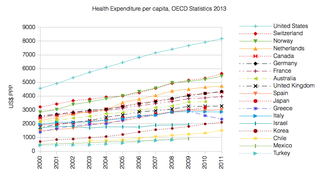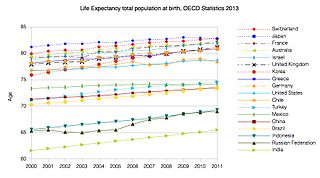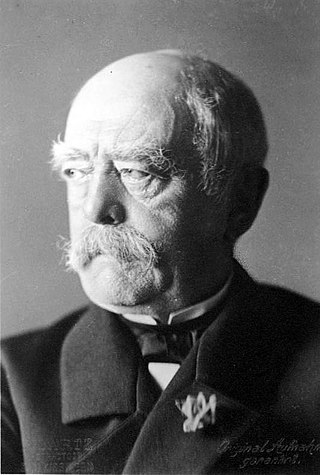Health care reform is for the most part governmental policy that affects health care delivery in a given place. Health care reform typically attempts to:
A health system, health care system or healthcare system is an organization of people, institutions, and resources that delivers health care services to meet the health needs of target populations.

The healthcare industry is an aggregation and integration of sectors within the economic system that provides goods and services to treat patients with curative, preventive, rehabilitative, and palliative care. It includes the generation and commercialization of goods and services lending themselves to maintaining and re-establishing health. The modern healthcare industry includes three essential branches which are services, products, and finance and may be divided into many sectors and categories and depends on the interdisciplinary teams of trained professionals and paraprofessionals to meet health needs of individuals and populations.
Health care in Ireland is delivered through public and private healthcare. The public health care system is governed by the Health Act 2004, which established a new body to be responsible for providing health and personal social services to everyone living in Ireland – the Health Service Executive. The new national health service came into being officially on 1 January 2005; however the new structures are currently in the process of being established as the reform programme continues. In addition to the public-sector, there is also a large private healthcare market.

The healthcare in Switzerland is universal and is regulated by the Swiss Federal Law on Health Insurance. There are no free state-provided health services, but private health insurance is compulsory for all persons residing in Switzerland.

Healthcare in the Netherlands is differentiated into several main categories. Firstly in three different echelons; secondly in physical (somatic) versus mental healthcare; and thirdly in "cure" versus "care".
Healthcare in Finland consists of a highly decentralized three-level publicly funded healthcare system and a much smaller private sector. Although the Ministry of Social Affairs and Health has the highest decision-making authority, the municipalities are responsible for providing healthcare to their residents.
The French health care system is one of universal health care largely financed by government national health insurance. In its 2000 assessment of world health care systems, the World Health Organization found that France provided the "best overall health care" in the world. In 2017, France spent 11.3% of GDP on health care, or US$5,370 per capita, a figure higher than the average spent by rich countries, though similar to Germany (10.6%) and Canada (10%), but much less than in the US. Approximately 77% of health expenditures are covered by government funded agencies.
Spain operates a universal health care system. According to the Organisation for Economic Co-operation and Development, total health spending accounted for 9.4% of GDP in Spain in 2011, slightly above the OECD average of 9.3%. The Spanish health care system is ranked as the 7th most efficient healthcare in the world, as indicated in the year 2000 in a report by the World Health Organization. Spain's healthcare system ranks 19th in Europe according to the 2018 Euro health consumer index. Spain is ranked 1st in the world in organ transplants.
Health care in Cyprus accounted for 7% of its GDP in 2014. Between 2010 and 2014, health care spending increased from $1,705 per capita to $2,062 per capita. Cyprus has a multi-payer health care system that consists of a public and private sector. The public sector is funded by payroll, earnings taxes, and employer contributions. The public sector healthcare provides social insurance for the employed, self-employed, and for several types of civil servant. A universal national health system, known as GESY, was implemented in Cyprus in June 2019. The new system aims to provide affordable and effective medical care to all people residing permanently in Cyprus.

Hungary has a tax-funded universal healthcare system, organized by the state-owned National Health Insurance Fund. While healthcare is considered universal, several reasons persist preventing Hungarian nationals to access healthcare services. For instance, a Hungarian citizen who lived abroad but is unable to show contributions to another country's healthcare system will not be able to access the Hungarian healthcare system free of charge. However, to the OECD, 100% of the total population is covered by universal health insurance, which is absolutely free for children, mothers or fathers with babies, students, pensioners, people with low income, handicapped people, priests and other church employees. In 2022 the cost of public health insurance is 8,400 HUF per month which is the equivalent of $23.69. The healthcare system underwent significant changes which also resulted in improving life expectancy and a very low infant mortality rate. According to the OECD Hungary spent 7.8% of its GDP on health care in 2012. Total health expenditure was $US1,688.7 per capita in 2011, US$1,098.3governmental-fund (65%) and US$590.4 private-fund (35%).
Healthcare in Slovenia is organised primarily through the Health Insurance Institute of Slovenia. In 2015, healthcare expenditures accounted for 8.10% of GDP. The Slovenian healthcare system was ranked 15th in the Euro health consumer index 2015. The country ranked second in the 2012 Euro Hepatitis Index.

The nation of Austria has a two-tier health care system in which virtually all individuals receive publicly funded care, but they also have the option to purchase supplementary private health insurance. Care involving private insurance plans can include more flexible visiting hours and private rooms and doctors. Some individuals choose to completely pay for their care privately.

This article provides a brief overview of the health care systems of the world, sorted by continent.
A new measure of expected human capital calculated for 195 countries from 1990 to 2016 and defined for each birth cohort as the expected years lived from age 20 to 64 years and adjusted for educational attainment, learning or education quality, and functional health status was published by The Lancet in September 2018. Latvia had the twenty-first highest level of expected human capital with 23 health, education, and learning-adjusted expected years lived between age 20 and 64 years.

As of 2019 Lithuanian life expectancy at birth was 76.0 and the infant mortality rate was 2.99 per 1,000 births. This is below the EU and OECD average.

Healthcare in Azerbaijan is provided by public and private healthcare institutions and regulated through the Ministry of Healthcare.

The State Institute for Drug Control is a Czech government agency responsible for regulation of the safe production of pharmaceuticals in the country, clinical evaluation of medicines and for monitoring the advertising and marketing of both medicines and medical devices. Its powers stem from the Act on Public Health Insurance.

The Bismarck Model is a health care system in which people pay a fee to a fund that in turn pays health care activities, that can be provided by State-owned institutions, other Government body-owned institutions, or a private institution. The first Bismarck model was instituted by Otto von Bismarck in 1883 and focused its effort in providing cures to the workers and their family. Since the establishment of the first Beveridge Model in 1946, where the focus was into providing healthcare as a human right to everyone with funding through taxation, nearly every Bismarck system became universal and the State started providing insurance or contributions to those unable to pay.













